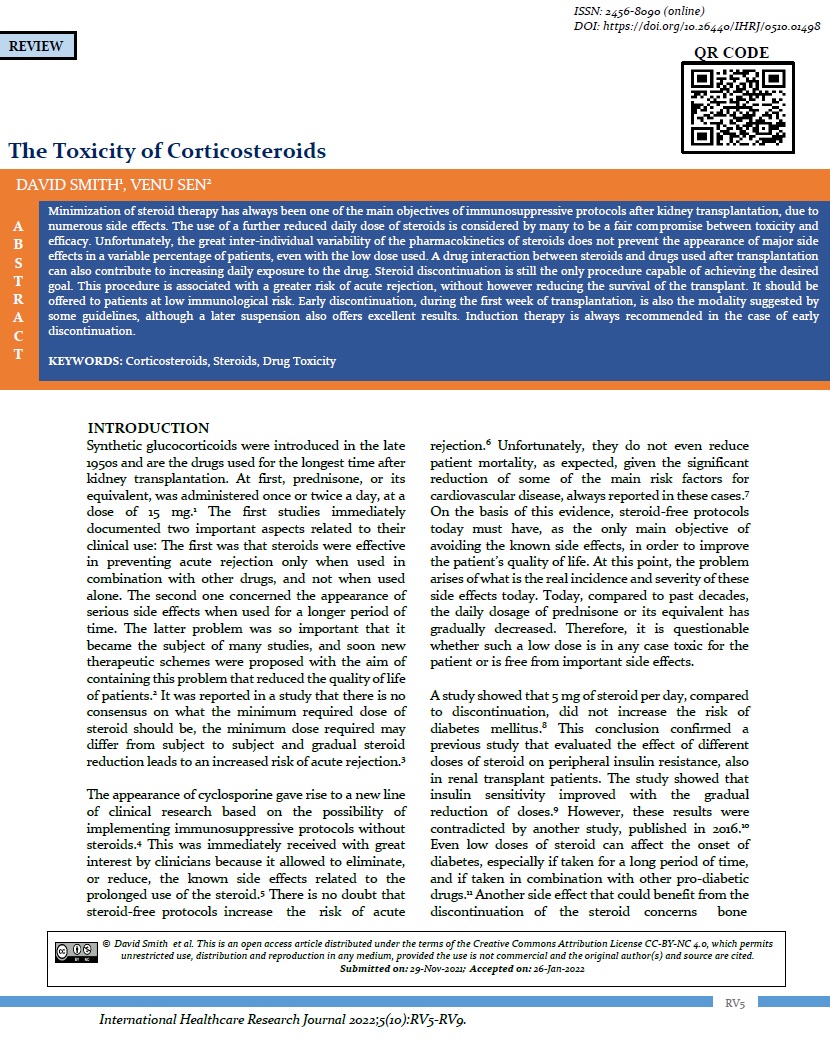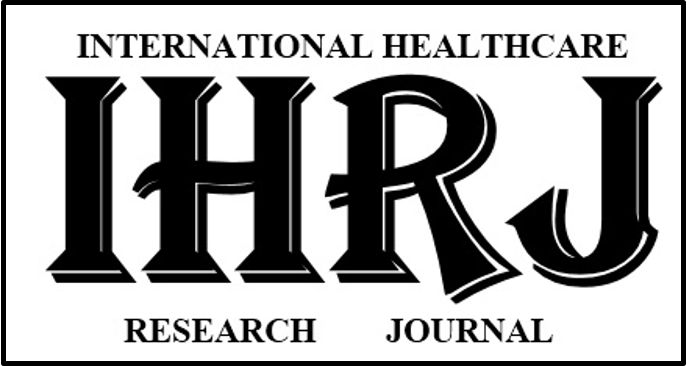The Toxicity of Corticosteroids
Abstract
Minimization of steroid therapy has always been one of the main objectives of immunosuppressive protocols after kidney transplantation, due to numerous side effects. The use of a further reduced daily dose of steroids is considered by many to be a fair compromise between toxicity and efficacy. Unfortunately, the great inter-individual variability of the pharmacokinetics of steroids does not prevent the appearance of major side effects in a variable percentage of patients, even with the low dose used. A drug interaction between steroids and drugs used after transplantation can also contribute to increasing daily exposure to the drug. Steroid discontinuation is still the only procedure capable of achieving the desired goal. This procedure is associated with a greater risk of acute rejection, without however reducing the survival of the transplant. It should be offered to patients at low immunological risk. Early discontinuation, during the first week of transplantation, is also the modality suggested by some guidelines, although a later suspension also offers excellent results. Induction therapy is always recommended in the case of early discontinuation.
Downloads
References
Murray JE, Merrill JP, Harrison H et al. Prolonged Survival of Human-Kidney Homograft by Immunosuppressive Drug Therapy. N Engl J Med. 1963; 268: 1315-23.
Siegel RR, Luke RG, Hellebusch AA. Reduction of Toxicity of Corticosteroid Therapy after Renal Transplantation. Am J Med. 1972;53:159-69.
Turcotte JG, Dickerman RM, Harper ML. Minimum steroid requirements in the late post-transplant period. Transplant Proc. 1975;7(1):83-8.
Calne RY, Thiru S, McMaster P et al. Cyclosporin A in Patients receiving Renal allograft from Cadaver Donors. The Lancet 1978;312(8104):1323-7.
Rhen T, Cidlowski JA. Antiinflammatory action of Glucocorticoids- New Mechanisms for Old Drugs. N Engl J Med. 2005; 353:1711-23.
Haller MC, Royuela A, Nagler EV et al. Steroid avoidance or withdrawal for kidney transplant recipients. Cochrane Database Syst Rev. 2016;(8):CD005632. https://doi.org/10.1002/14651858.CD005632.pub3
Knight SR, Morris PJ. Steroid Avoidance or Withdrawal after renal transplantation Increases the Risk of Acute Rejection but Decreases Cardiovascular Risk. A Meta-Analysis. Transplantation 2010;89: 1-14.
Pirsch JD, Henning AK, First MR et al. New-Onset Diabetes After Transplantation: Results From a Double-Blind Early Corticosteroid Withdrawal Trial. Am J Transplant. 2015; 15: 1982-90. https://doi.org/10.1002/10.1111/ajt.13247
Midtvedt K, Hjelmesaeth J, Hartmann A. Insulin Resistance after Renal Transplantation: The Effect of Steroid Dose Reduction and Withdrawal. J Am Soc Nephrol. 2004; 15:3233-9.
Thomusch O, Wiesener M, Opgenoorth M et al. Rabbit ATG or Basiliximab Induction for Rapid Steroid Withdrawal after Renal Transplantation (Harmony): an open-label, multicentre, randomised controlled trial. Lancet 2016; 388:3006-16. https://doi.org/10.1016/S0140-6736(16)32187-0
van Raalte DH, Brands M, van der Zijl NJ, Muskiet MH, Pouwels PJ et al. Low-dose glucocorticoid treatment affects multiple aspects of intermediary metabolism in healthy humans: a randomised controlled trial. Diabetologia 2011;54:2103–12.
Taweesedt PT, Disthabanchong S. Mineral and Bone Disorder after Kidney Transplantation. World J Transplant. 2015;5(4):231-42. https://doi.org/10.5500/wjt.v5.i4.231.
Nikkela LE, Mohanb S, Zhang A et al. Reduced Fracture Risk With Early Corticosteroid Withdrawal After Kidney Transplant. Am J Transplant. 2012;12: 649–59.
van Staa TP, Leufkens HGM, Abenhaim L et. Oral corticosteroids and fractures risk: relationship to daily and cumulative doses. Rheumatology 2000;39:1383-9.
van Staa TP, Leufkens HGM, Abenhaim L et. Use of oral corticosteroids and risk of fractures. J Bone Miner Res. 2000; 15:993-1000.
Bergmann TK, Barraclough KA, Lee KJ, Staatz CE. Clinical Pharmacokinetics and Pharmacodynamics of Prednisolone and Prednisone in Solid Organ Transplantation. Clin Pharmacokinet. 2012; 51:711–41.
Bergrem H, Jervell JAK, and Flatmark A. Prednisolone pharmacokinetics in cushingoid and non—cushingoid kidney transplant patients. Kidney International 1985;27:459-64.
Bergmann TK, Isbel N, Ostini R et al. Exploratory Study of Total and Free Prednisolone Plasma Exposure and Cushingoid Appearance, Quality of Life and Biochemical Toxicity in Adult Male Kidney Transplant Recipients. Clin Drug Investig. 2015;35:743–50.
Potter JM, McWhinney BC, Sampson L, Hickman PE. Area-under-the-curve monitoring of prednisolone for dose optimization in a stable renal transplant population. Ther Drug Monit. 2004;26:408-14.
Kozower M, Veatch L, Kaplan MM. Decreased clearance of prednisolone, a factor in the development of corticosteroid side effects. J Clin Endocrinol Metab. 1974;38:407-12.
Frey FJ, Amend WJ, Lozada F, et al. Pharmacokinetics of prednisolone and endogenous hydrocortisone levels in cushingoid and non-cushingoid patients. Eur J Clin Pharmacol. 1981;21(3):235–42.
Benet LZ, Frey FJ, Amend WJ Jr, et al. Endogenous and exogenous glucocorticoids in cushingoid patients. Drug Intell Clin Pharm. 1982;16(11):863–8.
Ost L, Bjorkhem I, von Bahr C. Clinical value of assessing prednisolone pharmacokinetics before and after renal transplantation. Eur J Clin Pharmacol. 1984;26(3):363–9.
Ionita IA, Ogasawara K, Gohh RY et al. Pharmacokinetics of Total and Unbound Prednisone and Prednisolone in Stable Kidney Transplant Recipients with Diabetes Mellitus. Ther Drug Monit. 2014; 36: 448–55. https://doi.org/10.1097/FTD.0000000000000045
Muhetaer G, Takeuchi H, Unezaki S et al. Clinical Significance of Peripheral Blood Lymphocyte Sensitivity to Glucocorticoids for the Differentiation of
High-risk Patients With Decreased Allograft Function After Glucocorticoid Withdrawal in Renal Transplantation. Clin Ther. 2014; 36:1264-72. https://doi.org/10.3727/215517912X639423
Song TR, Jiang YM, Liu JP et al. Steroid withdrawal or avoidance is safe in high-risk kidney transplants: A systematic review and meta-analysis. Kaohsiung J Med Sci. 2019; 35 :350-7. https://doi.org/10.1002/kjm2.12064
Clayton P, McDonald S, Chadban S, Steroids and Recurrent IgA Nephropathy After Kidney Transplantation. Am J Transplant 2011;11: 1645-9.
Di Vico MC, Messina M, Fop F et al Recurrent IgA nephropathy after renal transplantation and steroid withdrawal. Clin Transplant 2018;32: e13207.
Leeaphorn N, Garg N, Khankin VE et al Recurrence of IgA nephropathy after kidney transplantation in steroid continuation versus early steroid-withdrawal regimens: a retrospective analysis of the UNOS/OPTN database. Transplant International 2018; 31:175-86. https://doi.org/10.1111/tri.13075
Von Visger JR, Gunay Y, Andreoni KA et al The risk of recurrent IgA nephropathy in asteroid-free protocol and other modifying immunosuppression. Clin Transplant. 2014: 28: 845–54.
Barbour S, Djurdjev O, Gill J.S. et al. A propensity score matched analysis shows no adverse effect of early steroid withdrawal in non-diabetic kidney transplant recipients with and without glomerulonephritis. Kidney International 2019;96:460–9. https://doi.org/10.1016/j.kint.2019.02.041
Vincenti F, Schena FP, Paraskevas S et al. A randomized, multicenter study of steroid avoidance, early steroid withdrawal or standard steroid therapy in kidney transplant recipients. Am J Transplant. 2008; 8:307-16.
Wehmeier C, Hirt-Minkowski P, Amico P et al. Successful steroid withdrawal guided by surveillance biopsies-A single-center experience. Clin Transplant. 2018;32(3):e13181. https://doi.org/10.1111/ctr.13181
Vincenti F, Schena FP, Paraskevas S, Hauser IA, Walker RG etal. A Randomized Multicenter Study of Steroid Avoidance, Early Steroid Withdrawal or Standard Steroid Therapy in Kidney Transplant Recipients. Am J Transplant. 2008;8:307-16.
Mourad G, Glyda M, Albano L, et al. Incidence of Posttransplantation Diabetes Mellitus in De Novo Kidney Transplant Recipients Receiving Prolonged-Release Tacrolimus-Based Immunosuppression With 2 Different Corticosteroid Minimization Strategies: ADVANCE, A Randomized Controlled Trial. Transplantation 2017; 101:1924-34. https://doi.org/10.1097/TP.0000000000001453
KDIGO Clinical Practice Guideline for the Care of Kidney Transplant Recipients. Am J Transplant. 2009; 9(suppl 3):S10-S13.

Copyright (c) 2022 David Smith et al.

This work is licensed under a Creative Commons Attribution-NonCommercial 4.0 International License.


